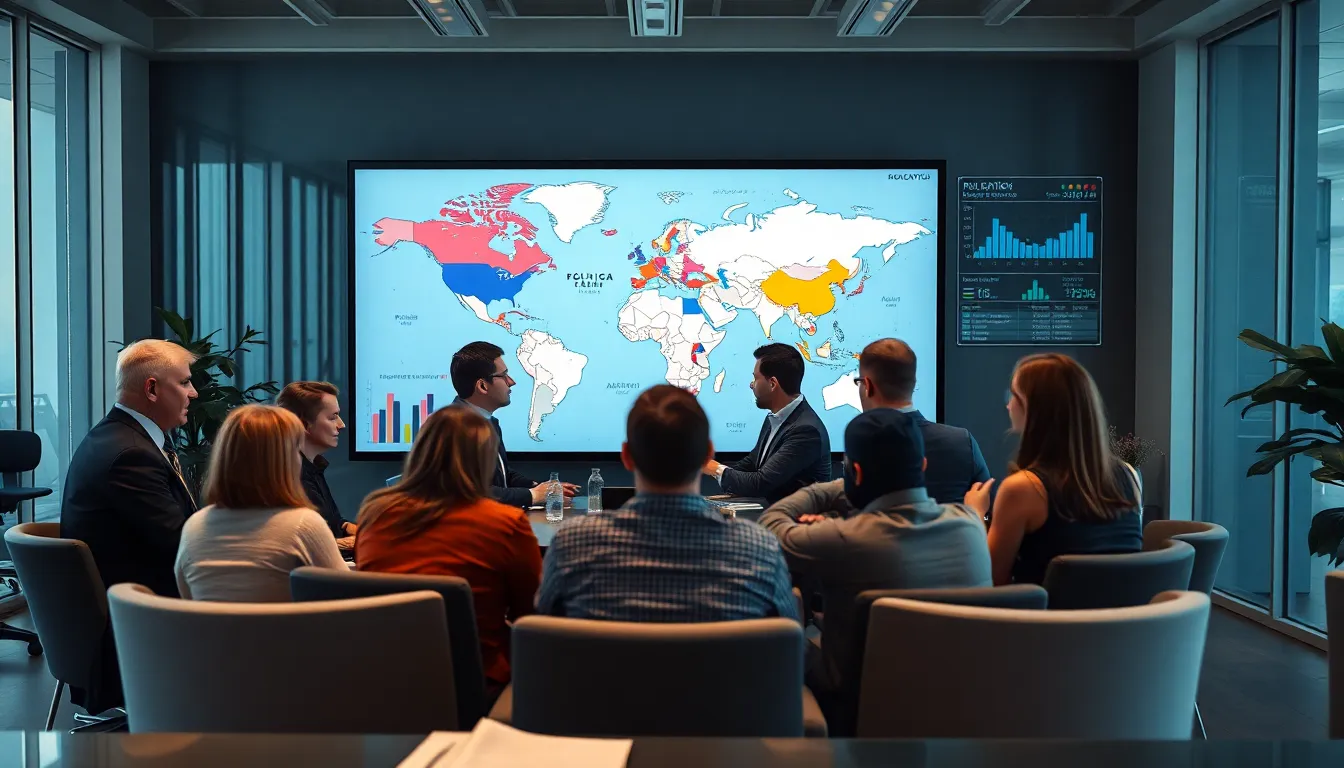Table of Contents
ToggleIn a world where political landscapes shift faster than a toddler’s mood, understanding political risk is essential for businesses and investors alike. Political risk analysis isn’t just a fancy term thrown around in boardrooms; it’s the secret sauce that helps navigate the unpredictable waters of global markets. Whether it’s a sudden election, a policy change, or a diplomatic spat, one misstep can turn a promising investment into a costly headache.
Understanding Political Risk Analysis
Political risk analysis helps businesses and investors navigate complexities in global markets. It identifies how political events impact investment environments.
Definition and Importance
Political risk encompasses the potential for losses due to political events or instability. It plays a crucial role in decision-making processes for investors. Understanding these risks allows entities to anticipate challenges and protect their interests. Investors rely on political risk analysis to evaluate the stability of different markets. This evaluation helps them determine where to allocate resources effectively, reducing exposure to unforeseen consequences. Businesses that consider political risk often achieve a competitive advantage.
Key Components of Political Risk
Multiple components influence political risk assessments. These include government stability, regulatory changes, and public sentiment. Government stability refers to the likelihood of regime changes or uprisings that can disrupt markets. Regulatory changes can alter business operations significantly, impacting profitability. Public sentiment influences political decisions, making it critical to gauge societal attitudes and movements. Additionally, international relations and trade policies affect economic environments, shaping investment strategies. Entities must analyze these components systematically to develop robust political risk profiles.
Tools for Political Risk Analysis

Political risk analysis utilizes various tools to evaluate and mitigate risks associated with political events. These tools fall into two main categories: qualitative and quantitative methods.
Qualitative Methods
Qualitative methods focus on understanding the context behind political events. Interviews with local experts provide insights into public sentiment and political stability. Case studies highlight historical patterns and help identify potential risks. SWOT analysis evaluates strengths, weaknesses, opportunities, and threats associated with market conditions. Scenario planning allows for exploration of possible future developments based on current events. Evaluating existing political reports, think tank analysis, and media coverage also contribute to building a comprehensive picture of the political landscape.
Quantitative Methods
Quantitative methods rely on numerical data to assess political risk. Statistical analysis evaluates trends in political stability and economic indicators. Surveys measure public opinion on government policies and leadership effectiveness. Indexes, such as the Political Risk Index, provide standardized metrics for comparison across regions. Data modeling forecasts potential risks based on economic conditions and policy changes. Regression analysis helps identify relationships between political events and market performance. Utilizing databases for incident tracking also supports the assessment of specific political risks over time.
Application of Political Risk Analysis
Political risk analysis plays a crucial role in shaping business strategies and investment decisions. Understanding the political landscape allows entities to navigate potential challenges effectively.
Economic Implications
Political risk analysis significantly impacts economic outcomes. Changes in government policies can directly affect trade agreements, taxation, and regulatory frameworks. For example, new tariffs imposed by a government can alter market access for companies operating internationally. Shifts in public sentiment may also influence economic stability, as protests or unrest can disrupt local commerce. Assessing these factors enables businesses to forecast potential economic disruptions and adapt their strategies accordingly. By evaluating political events, investors can identify opportunities and mitigate risks, enhancing financial resilience in uncertain environments.
Strategic Decision-Making
Strategic decision-making benefits greatly from thorough political risk analysis. Entities use insights from political assessments to align their business strategies with current political trends. When entering new markets, understanding local political dynamics serves as a foundation for effective planning. Moreover, evaluating potential political risks helps organizations prioritize resources and allocate investments wisely. Companies can also adjust their operational strategies based on political stability assessments, ensuring sustainable growth. By integrating these analyses into decision-making processes, businesses position themselves to navigate volatility while capitalizing on emerging opportunities.
Challenges in Political Risk Analysis
Political risk analysis faces several notable challenges that can impact its effectiveness. Data limitations present a significant hurdle in accurate assessments. Reliable and timely information may not always be available, leading to gaps in understanding the political landscape. Analysts often work with outdated or incomplete data sources that hinder comprehensive evaluations. Striking a balance between quantity and quality of data remains crucial to drawing reliable conclusions.
Predictive accuracy is another challenge within political risk analysis. Forecasting political events accurately proves to be difficult, considering the unpredictability of political developments. Analysts must account for a wide array of variables and potential outcomes. Oversimplification of complex situations can result in diminished predictability. Maintaining flexibility in strategy adaption helps mitigate the impact of unforeseen political changes and enhances the overall resilience of investment strategies.
Political risk analysis is essential for businesses and investors aiming to thrive in a complex global environment. By understanding the potential impacts of political events on investment landscapes, entities can make informed decisions that safeguard their interests. Utilizing both qualitative and quantitative tools allows for a comprehensive evaluation of risks, enabling organizations to adapt their strategies effectively.
As political landscapes continue to evolve, the ability to anticipate challenges and respond with agility becomes increasingly vital. A proactive approach to political risk not only mitigates potential losses but also positions businesses for sustainable growth in uncertain times. Embracing political risk analysis as a core component of strategic planning will empower organizations to navigate the intricacies of global markets with confidence.




